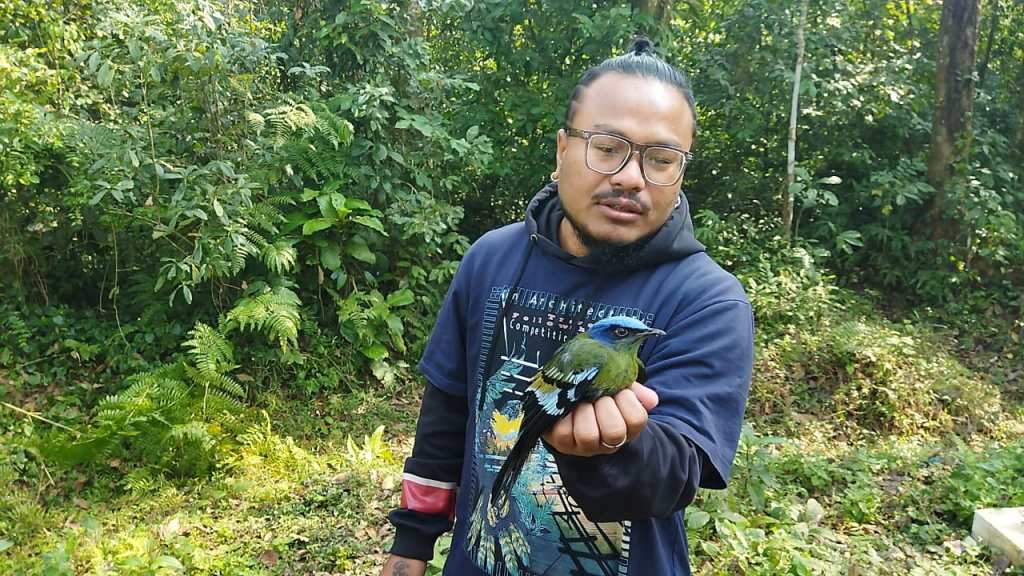Tinsukia, Jan 2: A Green cocoa bird (Cochoa viridis) was rescued from Lakhipathar reserve forest under Doomdooma forest division in upper Assam’s Tinsukia district on Monday morning.
Devojit Moran, an environmentalist of the region, found the injured Green cocoa at Lakhipathar reserve forest when he went to release a Python, which he had rescued.
For the first time, the rare Green Cocoa bird was sighted at Lakhipathar reserve forest.
Devojit Moran said, “Today, I have rescued a Green cocoa bird from Lakhipathar reserve forest, when I went there to release a Python, which had been rescued from Tingrai railway station on Monday morning. I found the rare bird in the reserve forest, which could not fly. May be the bird was injured with a catapult shot.”
“The rare bird is with me and I (have) kept the bird on a tree and gave food to eat. The bird is better and moving. Firoz Hussain, a famous Ornithologist of the region, guided me (on) how to keep the bird and what food should (be) given to the bird,” he further said.
Meanwhile, Firoz Hussain, founder of IDs of Indian Birds and famous Ornithologist, said, “For the first time the rare bird species was spotted in Lakhipathar reserve forest. Earlier, it was spotted in Dehing-Patkai National Park. It is a good news for the bird watcher because it is one of the rarest bird species.”

“The green cochoa (Cochoa viridis) is a bird species that is variously placed with the thrushes of family Turdidae or the related Muscicapidae (Old World flycatchers). It is considered closer to the former. This Himalayan thrush is moss green. The male has a blue crown, blue wings and tail with a broad black band on the tail. The female has a more greenish body with some rusty spots on the wing coverts,” informed Hussain, who is also a professional bird’s tour leader in Oriental Birding Tours.
He further said the green cochoa is found in Cambodia, China, India, Laos, Myanmar, Nepal, Thailand, Vietnam, and possibly Bhutan. Its natural habitats are subtropical or tropical moist lowland forests and subtropical or tropical moist montane forests. They make seasonal movements that are not well understood. Their distribution in winter in India is unclear as the species is found only in summer. “An old record from Uttaranchal (Nainital) is the westernmost record, and no recent records exist from Nepal. Most records are east of northwest Bengal,” he added.
The green cochoa is usually seen in pairs or small groups sitting in tall trees. They usually feed close to the ground, on mollusks, insects and berries. They sometimes launch aerial sallies to capture insects. This species breeds in summer, and the nest is much like that of the purple cochoa, but is usually placed close to water. Both parents take turns incubating. Their calls include a high, thin, even-sounding whistle, often given repeatedly but difficult to pin down.



